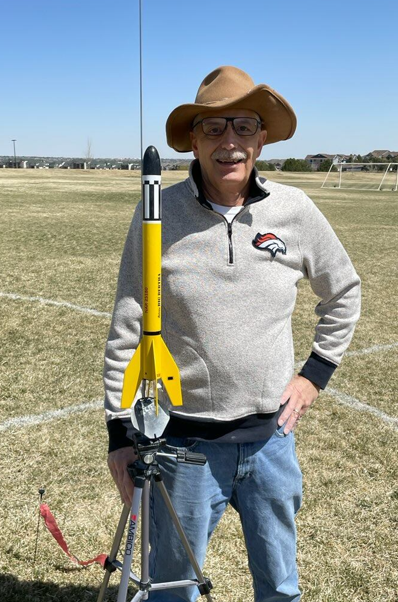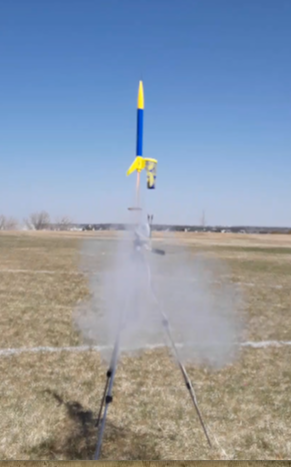This past Monday, the Colorado Front Range enjoyed a day with a small window of respite from the strong wind conditions that have been prevalent over the past several weeks.
It was good to finally have an opportunity to get some rocket flying in.
A handful of area rocketeers converged on the Dove Valley field to do just that. Interestingly, aside from Yours Truly Blogger, the group consisted of an entirely different set of rocketeers than that which participated in the March 3rd launch.
On hand this day were Roy Houchin, Paul Wolaver, Brock Wood, and Jesse Ulibarri. Paul and Brock are newcomers to our 'Band of Merrie Men'. Some of you might know Jesse as one of the hosts of The Model Rocket Show podcast.
I started the festivities off with a launch of a scratch-built replica of the Mark II Rock-A-Chute. Flying on A10 power, the bird turned in a perfect flight and recovery.
Paul Wolaver's first launch of the day was a Canadian Red Arrow, which he had painted in a green color scheme and dubbed 'Green Weenie'. Flying on a D12 motor, the model turned in an impressive flight, recovering safely on a rotating parachute.
Roy Houchin brought out his first model of the day, a Quest Nike Smoke. Flying on E9 power the bird flew very straight and high with successful parachute recovery and nearby landing.
My second launch of the day went to a newly-built Big Bertha.
A short conversation ensued during the model's prep time:
Ed: "Hey, Roy, Do you know what the recommended first-flight motor is for a Big Bertha?"
Roy: "I think it's a B6-4."
Ed (while inserting motor): "Great! C6-5 it is !"
(Blogger's note: I think I pulled this same one on Lee Reep in the not-so-distant past. My apologies, guys!)
Textbook Big Bertha flight on a C6-5.
 |
| Photo courtesy of Dave Pearson |
Next on the pad was Paul's modified Citation Patriot. The bird turned in an outstanding flight on a C6-5 motor, followed by a safe recovery.
Roy followed this up with a launch of his upscale Estes Flip Flyer. The model boosted straight and to a respectable altitude on a C5-3 motor. It arced over and started heading toward terra firma. We all feared a prang when - POP - off went the ejection charge, maybe fifty feet from the ground. At perhaps twent feet, the fully deployed rotors began spinning and landed the model safely. A real heart-stopper flight, indeed!
So far everything was going great. But, sadly, all success streaks must eventually come to an end.
Even though the wind was blowing at a sustained 5mph, with gusts up to 10, I opted to try out a glider flight. The honors went to an Estes Solo.
During boost , the model weathercocked into the wind on a B6-2 and flew to maybe 150 feet where it turned over and began streaking in. The ejection charge failed to eject the nose and parachute. Lawn dart...
The body tube sustained some crimps but can be replaced. The Solo will live to fly again - on a less windy day.
Paul soon had his next model on the pad and ready to fly. This time it was that classic kit, Der Red Max. Flying on a B6-4, the fun model made an excellent journey into the blue Colorado sky.
Roy soon his next bird prepped and ready to fly - a Black Brant III topped with a new Estes Astrocam video camera. The model flew very nicely and was successfully recovered.
 |
Around this time Brock Wood was ready to launch his first bird of the day, a completely scratch-built two-motor cluster rocket of his own design. Brock named the orange and blue model the 'Bronco', a very appropriate moniker, as the park in which we were flying is right across the street from the Denver Broncos headquarters and practice complex.
After experiencing a few difficulties with his home-built relay cluster ignition system, Brock got the Bronco off to a very nice flight. Dual A10-3T motors lofted the bird straight and high. Parachute deployment was perfect, and the model touched down nearby to the launch site. One fin had broken loose on the landing, but it was a great flight, nonetheless.
Following this, Roy had a unique model ready to go on the pad. This was a Peter Alway design of an LRD D-1, an early Russian test rocket. The interesting little silver, swept-fin rocket turned in an impressive flight on a B4-2 motor.
My final flight of the day went to the recently-constructed Crossfire ISX for its maiden flight. The model turned in a good run. The parachute tangled with the body tube and did not fully deploy, but the model fell slowly enough to land intact.
The last flight of today's launch session was put up by Paul with a long scratch-built, boat-tailed model named 'Gemini'. A C6-5 motor took the bird on a nice straight-up flight, followed by good recovery deployment and return.
Jesse Ulibarri did not bring any models to fly this day, but it was good catching up with him. We hadn't seen Jesse at a Dove Valley launch since before the pandemic.
Models not flown.....
I had brought along a small boost/glider and the Steampunk Protostar to fly, but chickened out on both because of the wind. Roy also had an upscale, R/C Scissorwing Transport that he opted out of flying due to the wind. He promised to bring it to the next launch. We definitely look forward to that. Paul also had packed along an intriguing assortment of larger models that did not see air time today.
Here is a parting pic of launch-day guest Dave Pearson displaying my Protostar:




























